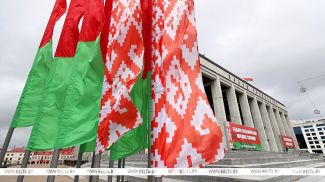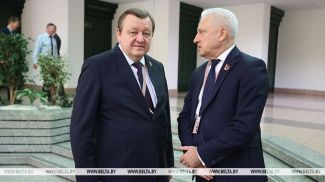MINSK, 23 October (BelTA) – Belarusian and Russian researchers keep studying lactoferrin, a protein obtained from milk of transgenic goats, Deputy Director General for Science at the National Research Center for Animal Breeding at the National Academy of Sciences of Belarus (NASB) Aleksandr Budevich said at a press conference, BelTA has learned.
Belarusian and Russian scientists were the first in the world to develop herds of transgenic goats that produce recombinant human lactoferrin. A human gene was incorporated into the DNA of the goats. This project was part of the Union State programs BelRosTransgen and BelRosTransgen-2. “The implementation of the Belarus-Russia project to produce lactoferrin is ongoing. Several healthcare institutions in Russia are conducting medical and biological research on this substance. Upon the instruction of the Council of Ministers, Belarus passed a comprehensive plan to promote this field of study. Scientists are studying properties of lactoferrin and synthesize various substances from it. Some 2-3g of protein on average can be obtained from one liter of transgenic goat milk. Sometimes up to 8g of protein can be extracted from such milk,” Aleksandr Budevich said.
The Union State Standing Committee requested a report on the outcomes of the research. “They are interested in the condition of the physical infrastructure, the progress in this field of study in the two countries and a possibility to implement a third program in this area. In order to enter the market of lactoferrin products, we need investments,” he said.
Lactoferrin is a unique multi-functional protein present in the milk of humans and mammals. It has some promising biopharmaceutical functions, like anti-bacterial, antiviral, anti-cancer, anti-inflammatory, immunomodulating, anti-oxidative and regenerative properties. This protein is used in the production of food supplements, baby foods and clinical nutrition, as well as in the pharmaceutical, perfumery and cosmetic industry. The global demand for lactoferrin is estimated at 90 tonnes per year.











